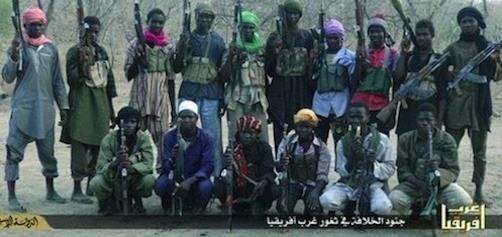
Some of the hundreds of girls and women rescued in a series of military raids on Boko Haram’s Sambisa forest have confirmed that they have tested positive to the human immunodeficiency virus (HIV) upon regaining their freedom.
In separate interviews with New York Times, the women described how they were locked in houses in dozens, and subjected to be at the beck and call of militants who forced them to have sex, sometimes with the specific goal of impregnating them.
“They married me,” said Hamsatu, 25, a young woman in a black-and-purple head scarf, looking down at the ground. She said she was four months pregnant, that the father was a Boko Haram member and that she had been forced to have sex with other militants who took control of her town.
“They chose the ones they wanted to marry,” added Hamsatu, whose full name was not used to protect her identity. “If anybody shouts, they said they would shoot them.”
30-year-old Yahauwa said she, alongside many other women, were raped repeatedly and threatened with death.
Four months pregnant, she said that the father was a Boko Haram member whom she was forced to have sex with.
Yana, a young woman who dawned golden bangles, said the fighters had “packed” her — a word many women have used to describe their imprisonment — with about 50 other women in a house in Bama.
“Inside the house, if they want to have an affair with a woman, they will just take her to a private place, so that the others won’t see,” she said.
She could not recall her age, and a relief worker at the camp said she had been raped so often that she was “psychologically affected”.
But Fanna, a 12-year-old girl, who had told relief officials in her camp entry interview that she was raped several times, suddenly insisted that she wasn’t touched.
“Is it from the people who forced me to have affairs with them?” she asked a relief worker on receiving the HIV test result, wiping the tears streaming down her face with her green head scarf. Later, she explained that she and many other women were “locked in one big room” and selected at random for sex.
READ ALSO: Jonathan would’ve suffered worse defeat if we didn’t help – Fani-Kayode
Many of them pregnant and battered, are showing up at a sprawling camp for the displaced outside the Borno State capital, Maiduguri, as Nigerian soldiers and other military forces try to push Boko Haram out of nearby territories it has occupied for much of the past year.
The full human toll of that occupation is only now emerging. More than 15,000 people have sought shelter at the camp at an abandoned federal office-worker training center, most of them women, relief officials said. Over 200 have so far been found to be pregnant, but relief officials believe many more are bearing the unwanted children of Boko Haram militants.
“The sect leaders made a very conscious effort to impregnate the women,” said the Borno governor, Kashim Shettima. “Some of them, I was told, even pray before mating, offering supplications for God to make the products of what they are doing become children that will inherit their ideology.”
The militants have openly promised to treat women as chattel. After Boko Haram militants kidnapped nearly 300 schoolgirls from the village of Chibok last year, the group’s leader called them slaves and threatened to “sell them in the market.”
“We would marry them out at the age of 9,” the leader, Abubakar Shekau, said in a video recording soon after the girls were abducted, prompting the global “Bring Back Our Girls” campaign.
As the group lost control of towns and thousands of people fled in recent weeks, a grim picture of that treatment has emerged: hundreds of women and girls as young as 11were subjected to systematic, organised sexual violence.
Officials in the nation’s capital, Abuja, have said little, but officials and relief workers in Borno State, where Boko Haram was born and their influence remain strongest, said the organised nature of Boko Haram’s sexual violence appeared to point to a deliberate self-perpetuation plan.
“It’s like they wanted to have their own siblings to take over from them,” said Abba Mohammed Bashir Shuwa, a senior state official in Maiduguri.
A relief official at the camp who is working closely with the abused women echoed that thought. said the official, Hadiza Waziri. “Most of these women now, they don’t want these pregnancies. They cannot love the children.”
The militants’ fixation with capturing, hoarding and “marrying” the women allowed some to witness central elements in their military strategy.
Meriam, 36, who had just arrived at the camp in Maiduguri from Gwoza, a Boko Haram headquarters town, spoke of being imprisoned with dozens of other women, including some, who were being trained as suicide bombers.
Click And Read More From Newstrack.ng



















